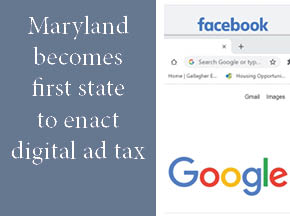
 The Maryland state legislature recently enacted a tax on digital advertisements that could present major ramifications for any company that sells or purchases digital advertisements in Maryland. The “Digital Advertising Tax” is the first of its kind in the United States. This law parallels pending legislation in Connecticut, Indiana, West Virginia, and New York, and follows a growing trend among European Union countries. The tax, however, has drawn substantial criticism from the business community, and is vulnerable to a wide swath of legal challenges.
The Maryland state legislature recently enacted a tax on digital advertisements that could present major ramifications for any company that sells or purchases digital advertisements in Maryland. The “Digital Advertising Tax” is the first of its kind in the United States. This law parallels pending legislation in Connecticut, Indiana, West Virginia, and New York, and follows a growing trend among European Union countries. The tax, however, has drawn substantial criticism from the business community, and is vulnerable to a wide swath of legal challenges.
Background.
The Digital Advertising Tax (House Bill 732 – 2020) was approved by both chambers of the Maryland General Assembly last year, but Governor Larry Hogan vetoed the legislation before it could take effect. On February 12, 2021, the General Assembly overrode Governor Hogan’s veto and paved the way for inevitable litigation.
The law, which has drawn criticism from Maryland small businesses and independent tax policy analysts, creates a new stream of funding for public education by taxing digital advertisements. Under the Act, large businesses—those with gross revenues of greater than $100 million in total and greater than $1 million derived from digital advertising services in Maryland—must pay a tax on revenue gained from serving digital ads to Maryland residents. The Act empowers the Comptroller to promulgate regulations that specify how to determine what percentage of a digital advertising business’s revenue originates in Maryland. As a result, even if the Act itself survives legal scrutiny, its accompanying regulations may present separate legal issues.
The General Assembly is expected to approve a supplemental piece of legislation this session that will (1) exempt broadcast and news media companies from the Digital Advertising Tax and (2) prohibit digital advertisers from directly passing along the cost of the tax to their customers through a surcharge, separate fee, or line-item.
The Act’s Legal Vulnerabilities.
In addition to drawing the ire of business interests, the new tax may be susceptible to challenges under state and federal law. The Maryland Attorney General recently cautioned that, while a digital advertising tax is not “clearly unconstitutional,” the Act “could raise concerns for a reviewing court.” The weight of these concerns will inform the viability of digital advertising taxes proposed in other states across the country.
Permanent Internet Tax Freedom Act
The Permanent Internet Tax Freedom Act (“PITFA”) forbids discriminatory taxes on electronic commerce. Under PITFA, a state may not levy taxes on e-commerce transactions if the state does not levy a similar tax on “transactions” involving similar services that are facilitated through other means. The validity of the Act therefore turns on the interpretation of the “transaction” it is taxing. If a court finds that the relevant “transaction” is the online transmission of digital advertisements, the law would run afoul of PITFA. If a court instead holds that the law taxes revenue from contracts for digital advertising services in Maryland—which may be entered into online or in person—the law could survive.
Dormant Commerce Clause
Likewise, the Digital Advertising Tax may run afoul of the Dormant Commerce Clause. Because Congress has the exclusive authority to regulate interstate commerce, federal courts have determined that states are precluded from enacting laws that “impede the flow of interstate commerce.” A reviewing court may determine that the tax is not “fairly apportioned” insofar as the tax rate increases based on a company’s global receipts, even if the company derives relatively modest revenues from its advertising services in Maryland. Since most of the companies that generate the largest amount of revenue attributable to digital advertising are located in other states, a court may suspect that the tax was designed to target out-of-state companies for the benefit of Maryland residents, which would be impermissibly discriminatory under settled dormant Commerce Clause jurisprudence.
Fourteenth Amendment Vagueness
The Act could also be invalidated as impermissibly vague under the Fourteenth Amendment. Commentators have described the Digital Advertising Tax as “a vague concept in search of definitions.” Several material terms in the Act are either undefined or ambiguous. For instance, the law does not clarify which providers in the supply chain may be subject to taxation, or when the revenue from their advertisements arises “in the state.” The law also offers little guidance on what types of online transactions constitute “digital advertising services.” Instead, it provides only a general definition and a non-exclusive list of examples. For these reasons, there may be a challenge to the constitutionality of the Act under the constitutional prohibition against vague laws.
* * *
In addition to the issues mentioned above, the Digital Advertising Tax could be challenged on other federal and state constitutional grounds. For instance, commentators have suggested that the Act is vulnerable to challenge under the First Amendment and the Equal Protection Clause of the Fourteenth Amendment. These arguments are less likely to succeed than the challenges outlined above, as the law does not discriminate on the basis of content and does not appear to make wholly arbitrary classifications.
Please reach out to our litigation team members Ella Aiken, Paul Caiola, Samuel Cowin, Joseph Dugan, Mark Saudek, and David Sommer to discuss your legal needs.
This client alert is for informational purposes and is not legal advice.
Attorney Spotlight

David G. Sommer
Partner410.951.1414
dsommer@gejlaw.comRepresenting lenders, receivers, real estate investors, health care institutions, municipalities, and other for-profit and not-for-profit organizations, David helps clients resolve business disputes through bankruptcy, litigation, and negotiation.